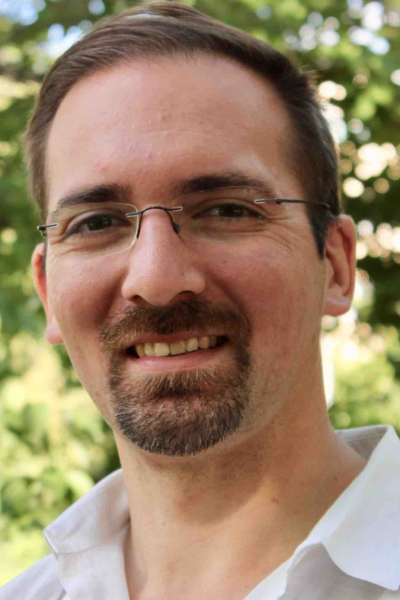Adrian Kantian
Biträdande universitetslektor vid Institutionen för fysik och astronomi; Materialteori
- Mobiltelefon:
- 073-892 19 63
- Fax:
- 073-892 19 63
- E-post:
- adrian.kantian@physics.uu.se
- Besöksadress:
- Ångströmlaboratoriet, Lägerhyddsvägen 1
- Postadress:
- Box 516
751 20 UPPSALA
Mer information visas för dig som medarbetare om du loggar in.
Kort presentation
Denna text finns inte på svenska, därför visas den engelska versionen.
I am a theoretical physicist studying strongly correlated quantum matter. My groups research focusses on basic theory for describing existing unconventional superconductors as well as engineering novel ones from 1D materials. This work is supported by the European Research Council and the Olle Engkvist Foundation.
Other work of mine concerns 1D excitons, as well as many-body state preparation and dynamics for ultracold atoms.
More information at http://materials-theory.physics.uu.se/kantian/
Nyckelord
- density-matrix renormalization group (dmrg)
- low-dimensional systems
- strongly correlated quantum matter
- superconductivity
- ultracold lattice-gases
Biografi
Denna text finns inte på svenska, därför visas den engelska versionen.
I obtained my PhD from the University of Innsbruck in 2010, after which I worked as a postdoctoral researcher with Thierry Giamarchi at the University of Geneva until 2015. During this time I participated extensively in the MAQUIS collaboration between U. Geneva, EPF Lausanne and ETH Zürich to develop massively parallelized density matrix renormalization group (DMRG) codes for use on parallel supercomputers. This was followed by an independent Fellowship at the Nordic Institute for Theoretical Physics, NORDITA (Stockholm) until 2017. In that year I was awarded a Starting Grant by the European Research Council and joined the Department of Physics and Astronomy - where I had already been a guest - as a Researcher (“Forskare”). Here, I will build a group to develop novel numerical and analytical theory for engineering unconventional superconductors with controlled properties from low-dimensional materials.
Forskning
Denna text finns inte på svenska, därför visas den engelska versionen.
My research focusses on developing basic theory that would allow to engineer unconventional superconductors (USC) on purpose, with controlled properties, using low-dimensional systems as building blocks. Currently, the USCs (in which electrons pair up from repulsive electron interactions) are of intense fundamental and applied interest, but the basic mechanisms behind them are poorly understood. This has prevented e.g. systematically raising critical temperatures for superconductivity in USC materials.
In contrast, the theory I am developing, and that my group will work on, will allow to build up USCs by coupling low-dimensional materials to each other or to external reservoirs. Their properties, including the mechanisms behind USC, can then be fully understood and predicted, allowing to systematically design better USCs, and to extend superconductivity to micron-length 1D nanowires.
The theories behind this will further allow to understand the as-yet unresolved mechanisms behind many existing quasi-1D USC materials, such as the Bechgaard and Fabre salts, the Sr-ladder “telephone number” compounds, and chromium pnictide.
This research makes extensive use of the parallelized density matrix renormalization group (DMRG) codes developed in the MAQUIS collaboration between the University of Geneva and ETH Zürich. It is complemented by Quantum Monte Carlo and DMFT methods and the analytical techniques of bosonization combined with RG treatments, as well as functional RG.
This work is supported by the European Research Council through a Starting Grant, as well as Uppsala University.
I am further interested in and working on other quantum many-body states and systems, such as 1D bilayer exciton condensates, chiral quantum spin liquids, many-body localized systems and doped graphene nanoribbons, as well as many-body state preparation for quantum emulation in ultracold atoms confined to optical lattices, and mobile impurities in 1D quantum liquids.
Publikationer
Senaste publikationer
- Solving 2D and 3D lattice models of correlated fermions (2023)
- Transient superconductivity in three-dimensional Hubbard systems by combining matrix-product states and self-consistent mean-field theory (2023)
- Superconducting pairing from repulsive interactions of fermions in a flat-band system (2022)
- Monolayer CrCl3 as an Ideal Test Bed for the Universality Classes of 2D Magnetism (2021)
- Dimensional crossover and phase transitions in coupled chains (2020)
Alla publikationer
Artiklar
- Solving 2D and 3D lattice models of correlated fermions (2023)
- Transient superconductivity in three-dimensional Hubbard systems by combining matrix-product states and self-consistent mean-field theory (2023)
- Superconducting pairing from repulsive interactions of fermions in a flat-band system (2022)
- Monolayer CrCl3 as an Ideal Test Bed for the Universality Classes of 2D Magnetism (2021)
- Dimensional crossover and phase transitions in coupled chains (2020)
- Dynamics of a mobile impurity in a two-leg bosonic ladder (2019)
- Understanding repulsively mediated superconductivity of correlated electrons via massively parallel density matrix renormalization group (2019)
- Dynamical Disentangling and Cooling of Atoms in Bilayer Optical Lattices (2018)
- True Bilayer Exciton Condensate of One-Dimensional Electrons (2017)
- Minimizing nonadiabaticities in optical-lattice loading (2015)
- Lattice-Assisted Spectroscopy (2015)
- Matrix Product State applications for the ALPS project (2014)
- Competing Regimes of Motion of 1D Mobile Impurities (2014)
- Quantum dynamics of a mobile spin impurity (2013)
- Probing Real-Space and Time-Resolved Correlation Functions with Many-Body Ramsey Interferometry (2013)
- Dynamics of an impurity in a one-dimensional lattice (2013)
- Quantum dynamics of impurities in a one-dimensional Bose gas (2012)
- η Condensate of Fermionic Atom Pairs via Adiabatic State Preparation (2010)
- Atomic Color Superfluid via Three-Body Loss (2009)
- Quantum states and phases in driven open quantum systems with cold atoms (2008)
- Preparation of entangled states by quantum Markov processes (2008)
- Physical replicas and the Bose glass in cold atomic gases (2008)
- Atomic lattice excitons (2007)
- Strongly correlated Fermi-Bose mixtures in disordered optical lattices (2006)
- Cold atomic gases in optical lattices with disorder (2006)
- Repulsively bound atom pairs in an optical lattice. (2006)
- Disordered ultracold atomic gases in optical lattices (2005)
- Atomic Fermi-Bose Mixtures in Inhomogeneous and Random Lattices (2004)

